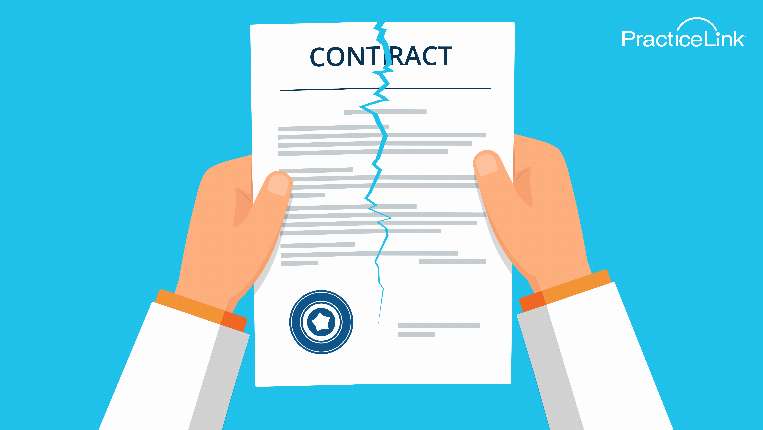Minimize the chance of a breach of contract
 Posted by Michele Gutermuth
Posted by Michele Gutermuth

You can’t find a lot of information about breach of contract because it is something no one wants to talk about. Who would believe that a professional - such as a physician - would sign an employment agreement, even possibly accept a signing bonus, and then not show up for their first day of employment?
Or maybe it’s not that dramatic. Perhaps they start the job and you think everything is going great then suddenly, after one month, your new hire sends you an email or sets up a meeting to tell you they are leaving with very little notice.
Do a Google search, and you will find little to no information about a doctor doing a no-show for their job after signing a contract. I promise you this happens, and it happens more often than you think. If you contract with a physician recruiting firm, this is called a falloff in the industry. A falloff can occur even if a physician begins their job but does not fulfill their entire contract term.
Good physicians do breach their contracts. It doesn’t mean they are not good physicians, but it could mean a lot of things:
First, it could mean your organization did not do all it could have done to make sure all the physician’s needs were met. Maybe your organization could not help this. Is it possible you are short-staffed? Perhaps the physician didn’t even express to you there was a problem.
Second, it could mean the physician made an emotional decision when signing their agreement and did not thoroughly discuss it with their family, which could be taking an emotional toll.
A third possible reason could be they received a better offer and decided they needed to take it regardless of the consequences, or they didn’t realize there were any consequences.
Here are the three things you can do to avoid this from happening to you as a recruiter:
- After a physician signs the employment agreement, think about it as the hard part of your job, not the easy part. It would be easy to take a deep breath and think to yourself, "GREAT! I filled my opening and now the hard part is done," when the opposite is true.The hard part is keeping your doctor. Now the work begins. Call, email or text your placed physician at least once a month for business and once a month for less business-type items.
For example, say, "Hi, I was driving around the community today, and I saw the house you are moving into. It is so pretty!" If they have kids attending the schools, you can say, "Hi, I just saw the school play today; it was so cute. I can’t wait to see your family in the community."
There is always something you can do to reach out. If you are in a more metropolitan area, you can talk about a new restaurant or the new sports season or musical in the community.
- It is a trend to give an offer fast or lose the doctor, but that doesn’t mean you cannot encourage the physician to get good legal advice. Ensure the doctor has the offer, but give the physician enough time to get the appropriate health care attorney’s advice.You can let the physician know you won’t change many things in the agreement if this is the case, but you want them to understand what they agree to.
- Consider thinking twice about placing a noncompete clause in your employment contract. Make sure you talk to your legal counsel about this, but there are many market changes regarding noncompete clauses. Federal, state and local laws could affect this decision, but it can also be a turnoff for physicians.If all you talk about in the community is providing excellent health care, then it can come across as contradictory if you place a clause that prohibits a physician from continuing to provide quality care locally upon leaving your organization. Consider removing the noncompete clause if they fulfill their contract term, or use a nonsolicitation clause as a possible alternative.
Things you can do in case this happens to you:
- Place a liquidation damage clause in your agreement. This way, there is an amount placed in writing for breaching a contract, which is usually enforceable.
- Have a no-cause clause that works for both of you with an agreeable, reasonable time frame. Most physician contracts have a 90-day out clause, but many have as many as six months.

